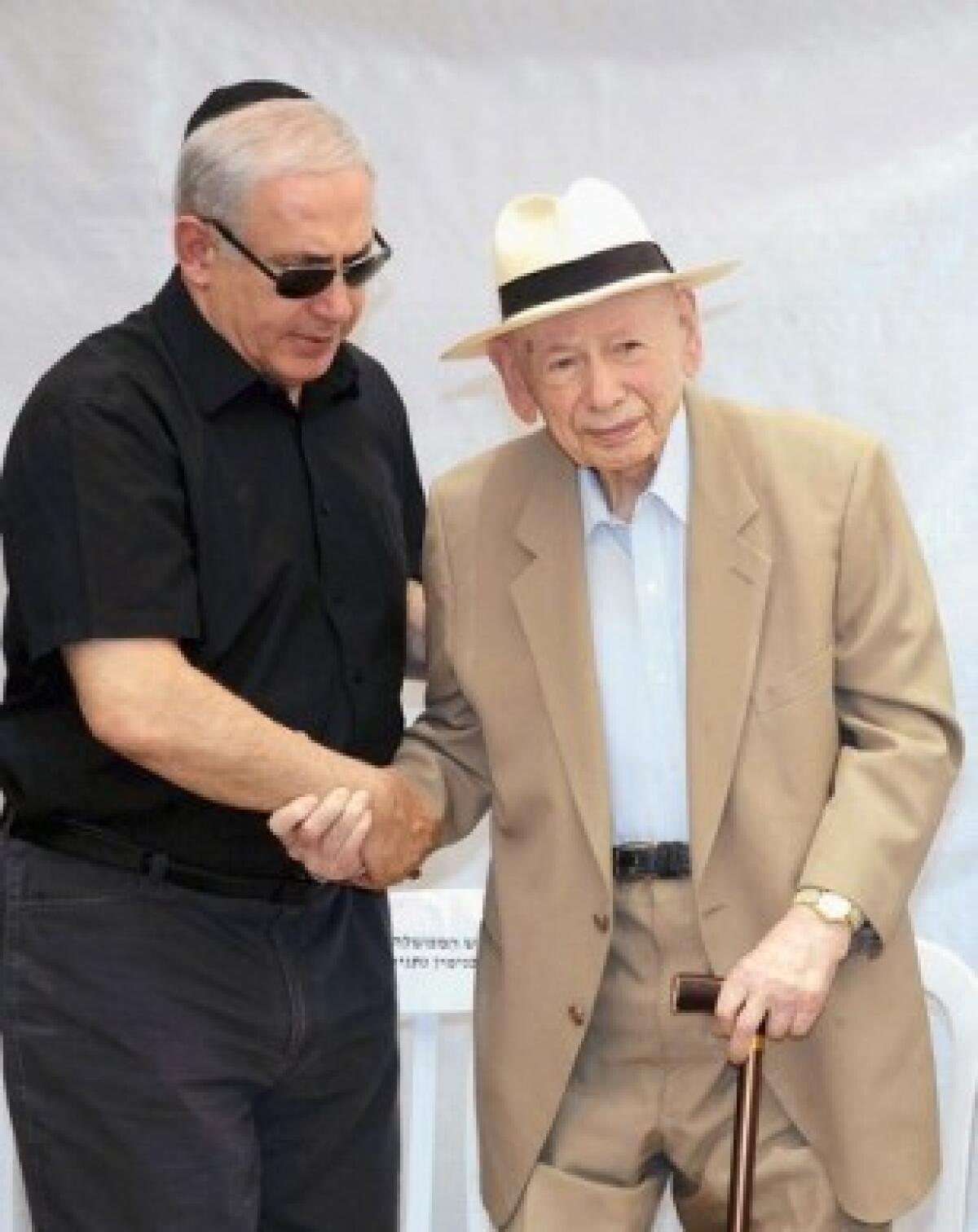Ben-Zion Netanyahu dies at 102; father of Israeli prime minister

- Share via
JERUSALEM — Historian Ben-Zion Netanyahu, the father of Prime Minister Benjamin Netanyahu and the man said to have had the most profound influence on the conservative Israeli leader, died early Monday in his Jerusalem home. He was 102.
The elder Netanyahu served as the personal secretary of Zionism’s prominent Revisionist leader, Zeev Jabotinsky, in the United States during World War II, lobbying for the creation of a Jewish state. He also pursued his academic work, specializing in medieval Spanish Jewry and the roots of the Spanish Inquisition.
Many attribute the prime minister’s deep convictions and interest in history to his father’s unwavering hawkish beliefs; the Revisionist movement differed sharply from the socialist Zionists of the early 20th century and did not believe in partitioning what was Palestine during the British mandate into separate Jewish and Arab states. “Benjamin Netanyahu was raised on uncompromising Zionism,” Knesset Speaker Reuven Rivlin told Israel Radio.
Netanyahu’s father also believed that Jews have long faced racial discrimination and that efforts to reach compromises would prove futile. Benjamin “Netanyahu has been guided by his father’s message, which could be summarized as ‘the world is against us,’ ” wrote columnist Akiva Eldar in the left-leaning daily Haaretz.
Born Ben-Zion Milikovsky in Warsaw in 1910, the elder Netanyahu emigrated in 1920 to Palestine with his parents. They changed the family name after the move. Netanyahu and his wife, Tzila, were married in 1944, and they had three sons.
The Netanyahus moved back and forth between the United States and the fledgling state of Israel after it was founded. Israeli academia, however, did not embrace the scholar, whose right-wing beliefs went against the grain of the prevalent socialist thinking, and he continued his scholarship with various American universities, finally becoming a professor emeritus at Cornell University.
Their final return to Israel came in 1976, after their eldest son, Yoni, was killed during an Israeli commando operation to rescue hostages on an Air France flight that was hijacked to Entebbe, Uganda. Benjamin Netanyahu delivered the news to his parents.
“The longest, most difficult journey of my life,” he later said. “Since then, our family changed drastically.”
As the nation’s leadership gathered in Jerusalem on Monday afternoon for Ben-Zion’s funeral, the prime minister recalled his father’s deep commitment to Judaism, his historical perspective and his efforts to hasten the establishment of a Jewish state. “You always taught us commitment to the nation and state, but no less than that was your commitment to us,” Netanyahu said of his close family.
Condolences came from across the political spectrum, and opposition parties withdrew no-confidence motions and bills to dissolve parliament and move to early elections out of respect for the week of mourning.
“A great historian and a great Jew,” President Shimon Peres said at a public event earlier in the day, asking the audience to observe a minute of silence in his memory.
Netanyahu was also cited as a man of unwavering principles.
“Benjamin Netanyahu was raised on this fear of the enemy and was certainly influenced by it, as on the issue of Iran; he has the sense of mission,” Gil Samsonov author of “The Likud Princes,” told Israel Radio.
Netanyahu is survived by his remaining sons, the prime minister and Ido Netanyahu, a physician, author and playwright.
Sobelman is a news assistant in the Los Angeles Times’ Jerusalem bureau.
More to Read
Start your day right
Sign up for Essential California for the L.A. Times biggest news, features and recommendations in your inbox six days a week.
You may occasionally receive promotional content from the Los Angeles Times.






